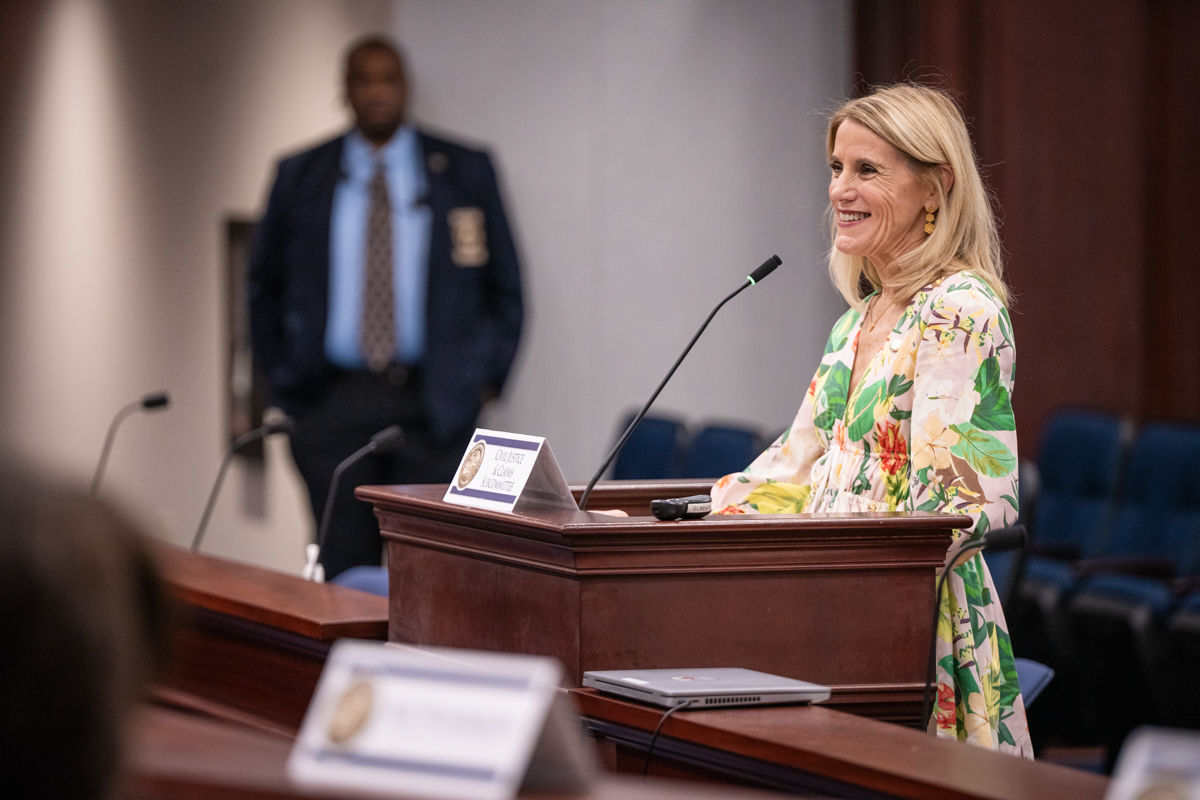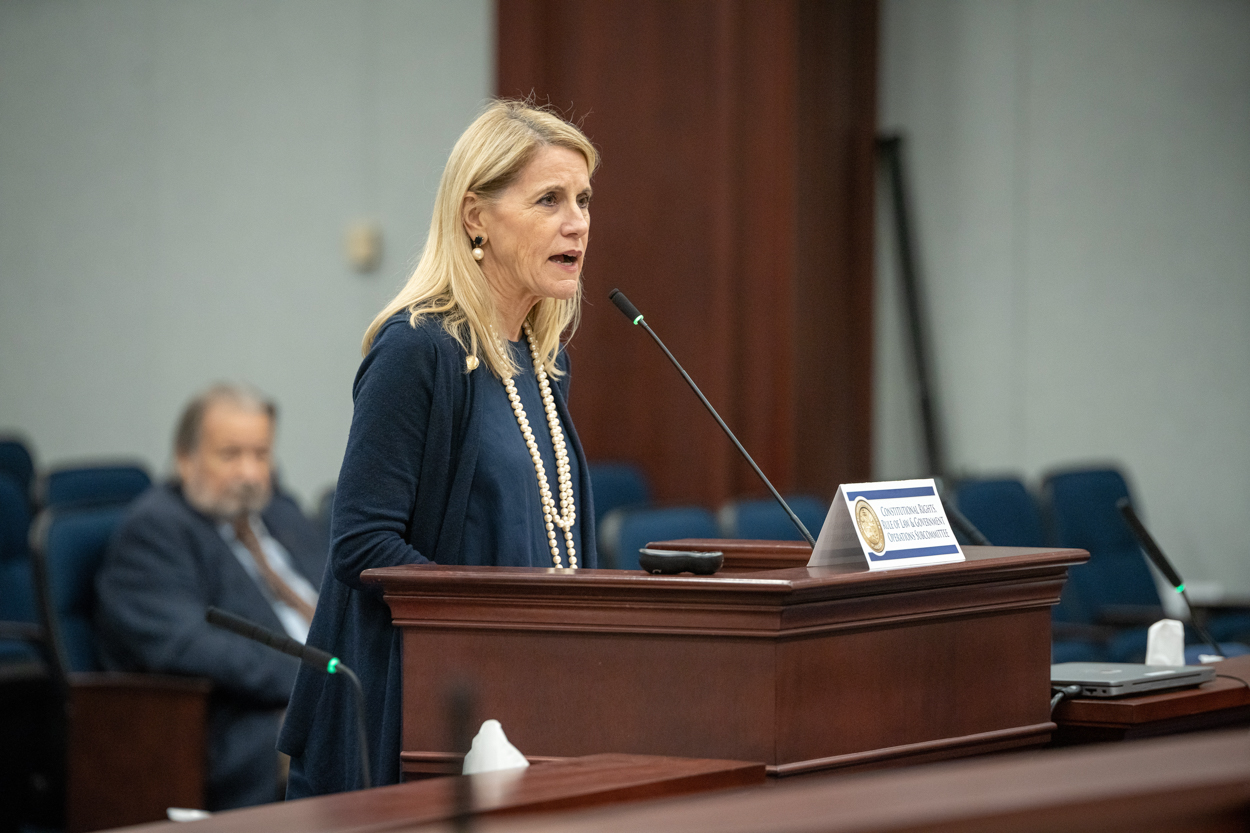Miami Rep. Vicki Lopez’s latest bill to fine-tune the Live Local Act she and Miami Sen. Alexis Calatayud passed in 2023 is bound for the House floor after clearing its final committee stop.
Before the House Commerce Committee’s 20-3 vote on HB 943, Lopez made several amendments to the measure so it better aligns with its Senate counterpart while still containing “a few key differences.”
She said the changes that HB 943 contemplates are meant to bolster the Live Local Act and stem the tide of rising unaffordability across Florida, particularly in populous areas like Miami-Dade County where long-term residents are being priced out of their homes.
“Our retirees are having to leave after they have made an investment in living in Florida, but more importantly, our young people who have grown up here and have studied here (are) leaving, and so is now our workforce,” she said.
“We actually have cities who have said, ‘We don’t want affordable housing in our cities.’ What’s next?”
HB 943 and its upper-chamber analog (SB 1730) by Calatayud are the second update to the Live Local Act lawmakers enacted in 2023 to enable developers to build more residential projects that contain affordable housing without having to abide by certain city and county requirements that previously impeded them.
Proponents of the measure, which Republicans Lopez and Calatayud updated last year to include clearer guidelines and special considerations for the Keys, say it’s necessary to surmount barriers born of NIMBYism and deliver much-needed units to Florida’s affordable housing inventory.
Opponents say the changes expose localities to overdevelopment incongruous with their growth plans and give developers too much power while requiring comparatively little of them in return.
HB 943, among other things, would:
— Prohibit local governments from adopting or enforcing any law, ordinance, rule or other measure that limits or prohibits most forms of affordable housing.
— Require local governments to authorize multifamily and mixed-use residential developments on public and church-owned lands zoned for commercial, industrial or mixed use if at least 40% of the projects are rental units offered at affordable rates for at least 30 years.
— Authorize local governments to approve housing developments on any parcel owned by a religious institution that contains a house of worship, regardless of the underlying zoning, if at least 10% of the project’s units are for affordable housing.
— Prohibit local governments from requiring more than 10% of a mixed-use residential project to be for non-residential purposes.
— Require counties and cities to allow construction of accessory dwelling units — independent living spaces added to homes or properties sometimes referred to as “granny flats” — in areas zoned for single-family residential use, and prohibit localities from “unreasonably increasing” the cost to build them.
— Require county governments to, upon request of an applicant, reduce the parking requirement for a proposed development by 20%.
— Require the Florida Housing Finance Corp. to fund housing near U.S. Department of Veterans Affairs medical facilities.
— Exempt several specific areas — including the Wekiva Study Area, Everglades Protection Area, Florida Keys Area of Critical Concern, City of Key West Area of Critical State Concern — from Live Local Act requirements.
— Exempt contributing structures and buildings listed on the National Register of Historic Places.
— Require annual reporting on Live Local Act progress, which Lopez said will enable policymakers “to understand whether or not we are actually building affordable housing.”
— Allow any parcel previously used as a golf course, tennis court or swimming pool to be used for the development of an affordable housing building of up to three stories in height.
— Maintain local requirements for public hearings over developments that involve the demolition and replacement of locally designated historic properties and structures classified as “contributing” to historic structures in a local property database on or before July 1, 2023.
That last provision earned plaudits from Miami Beach Commissioner Alex Fernandez, who passed along a message of “sincere gratitude” through the city’s intergovernmental affairs liaison, Peter Lissarrague.
“This amendment provides critical protections for historic buildings within Miami Beach’s nationally designated Architectural District, the most celebrated collection of art deco architecture in the United States,” the statement said. “This is a meaningful step in the right direction.”
Other supporters of the bill included the Florida Chamber of Commerce, AARP and real estate company Wendover Housing. The Florida Association of Counties and Florida League of Cities signaled opposition.
Democratic Reps. Kevin Chambliss, Christine Hunschofsky and Felicia Robinson voted against the bill. But Hunschofsky, a Parkland lawmaker who is slated to lead House Democrats in the 2027-28 term, praised Lopez for refining it to better protect historic areas.
“There are still significant preemptions to municipalities and, additionally, the adding of the golf courses and the recreation areas into this — especially where I live, where we’ve had a lot of issues with these areas — leave me to be a ‘no’ today,” she said. “But I do want to commend that certain areas you did make better, and I do want to thank you for your work.”
Chambliss, of Homestead, said he appreciated what HB 943 seeks to accomplish, but smaller municipalities he’s spoken with worry that developers, armed with even more power, will come in and all but take control.
“Unfortunately, developers don’t take an oath of office. They run a business,” he said. “And some of my cities are concerned that if they don’t have an opportunity to make sure that the development is the right development for a city, that gives them pause.”
Orlando Democratic Rep. Anna Eskamani thanked Lopez for meeting with her and Orlando stakeholders. While the legislation isn’t “exactly what we all wanted,” she said, it still strikes “a balance between respecting environmental concerns while also trying to incentivize and build housing that’s below market value.”
“I also empathize with the preemption concerns, but I think to some degree we are also combating NIMBYism every day,” she said. “I see it in my district where we have some really great projects being proposed, but then, due to misinformation and other types of perceptions of affordable housing, it gets pushed back.”
Sweetwater Republican Rep. David Borrero said Florida needs to act fast to counteract a troubling population decline in the state’s most populous county. He noted that despite an influx of transplants to Florida, Miami-Dade has steadily shed residents in recent years amid spiraling housing unaffordability.
“That’s very alarming. At a time where more residents are moving into our state, we see people fleeing Miami-Dade County, and the No. 1 reason is because it’s so darn expensive,” he said.
“The No. 1 culprit (is) local governments. They have caused so many people to leave through … onerous zoning regulations, permitting requirements. It used to be that you could get through … local government approvals to build a project within three to six months. Now the average time you’re looking at is about two (to) five years. … This has created a huge crisis.”
HB 943 now awaits scheduling for a House floor vote. SB 1730 is similarly positioned after advancing through its last Senate committee stop last week.
Post Views: 0

 Politics8 years ago
Politics8 years ago
 Entertainment8 years ago
Entertainment8 years ago
 Entertainment8 years ago
Entertainment8 years ago
 Entertainment8 years ago
Entertainment8 years ago
 Tech8 years ago
Tech8 years ago
 Tech8 years ago
Tech8 years ago
 Tech8 years ago
Tech8 years ago
 Politics8 years ago
Politics8 years ago











